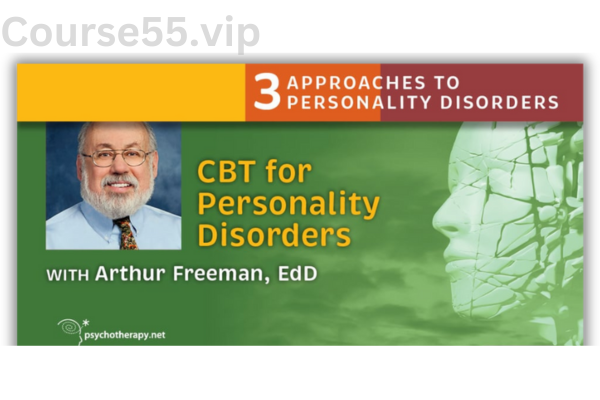-
×
 Legal Issues in Behavioral Health Maryland: Legal and Ethical Considerations By Lois Fenner - PESI
1 × $23.10
Legal Issues in Behavioral Health Maryland: Legal and Ethical Considerations By Lois Fenner - PESI
1 × $23.10 -
×
 Mindfulness-Based Stress Reduction for Teens By Gina Biegel - PESI
1 × $23.10
Mindfulness-Based Stress Reduction for Teens By Gina Biegel - PESI
1 × $23.10 -
×
 Barb Stepp’s NLP Master Practitioner By Barbara Stepp
1 × $23.10
Barb Stepp’s NLP Master Practitioner By Barbara Stepp
1 × $23.10 -
×
 Orthopedic Challenges: Expert Strategies to Avoid Harm & Enhance Healing By William Mazzocco - PESI
1 × $23.10
Orthopedic Challenges: Expert Strategies to Avoid Harm & Enhance Healing By William Mazzocco - PESI
1 × $23.10 -
×
 SEO Operating System By James Ewen
1 × $15.00
SEO Operating System By James Ewen
1 × $15.00
CBT for Personality Disorders With Arthur Freeman
$49.00 Original price was: $49.00.$7.70Current price is: $7.70.
SKU: C55vip.46380dsfqeaSn
Category: Download
Tags: Arthur Freeman, CBT for Personality Disorders, Freeman
Cognitive Behavioral Therapy for Personality Disorders: Insights from Arthur Freeman – Digital Download!

CBT for Personality Disorders With Arthur Freeman
Overview

Exploring Arthur Freeman’s Insights on Cognitive Behavioral Therapy for Personality Disorders
Cognitive Behavioral Therapy (CBT) has long been recognized as a valuable tool for treating a wide range of psychological conditions. However, personality disorders, with their complex cognitive and behavioral patterns, present unique challenges for both clients and therapists. Arthur Freeman, a leading expert in this field, has greatly contributed to advancing our understanding of CBT’s application to personality disorders. His influential book Cognitive Therapy of Personality Disorders offers essential insights that can guide practitioners in their work. This article delves into Freeman’s structured method, the process of assessing these disorders, how to build a therapeutic relationship, effective techniques, and the broader impact of his work on treating personality disorders.
Freeman’s Comprehensive Framework for Addressing Personality Disorders
Arthur Freeman’s approach to CBT is methodical and comprehensive, embodying the systematic nature of cognitive therapy. A central element of his method is the in-depth clinical assessment that helps identify the cognitive and behavioral patterns typical of personality disorders. This thorough assessment allows therapists to understand the unique psychological landscape of each client, ultimately forming the basis for an individualized treatment plan. By recognizing maladaptive schemas—core beliefs that distort perceptions and interfere with interpersonal relationships—therapists are better equipped to tailor treatment to meet the client’s specific needs.
Unraveling Cognitive Distortions in Personality Disorders
Freeman places a strong emphasis on the importance of clear cognitive conceptualization when treating individuals with personality disorders. Since these clients often view the world through distorted lenses, identifying and addressing these cognitive distortions is a key part of the therapeutic process. The assessment process is likened to a detective carefully piecing together a case, requiring both attention to detail and a deep understanding of the client’s behavior.
Some common cognitive distortions in individuals with personality disorders include:
-
All-or-nothing thinking: Viewing situations in extremes without considering alternative perspectives.
-
Overgeneralization: Drawing sweeping conclusions from a single incident or limited experience.
-
Expecting the worst: Assuming catastrophic outcomes in a variety of situations.
Therapists use these insights to help clients reflect on and challenge their existing beliefs, guiding them through the process of changing deeply ingrained cognitive patterns.
Creating Individualized Treatment Plans Based on Cognitive Insights
After identifying the cognitive distortions present in a client’s thinking, therapists can customize their treatment plans to address the unique challenges of each individual. This personalized approach improves client engagement, making the therapeutic process more effective. By incorporating specific cognitive-behavioral techniques, therapists can challenge maladaptive thought patterns and encourage the development of healthier, more balanced thinking. This tailored method fosters a sense of hope and allows clients to engage in meaningful self-discovery and personal growth.
The Crucial Role of the Therapeutic Relationship in Treatment
A core component of Freeman’s approach is the establishment of a strong, trusting therapeutic relationship. Clients dealing with severe personality disorder symptoms often require a high level of empathy and trust in their therapist to engage fully in the treatment process. Freeman’s nonjudgmental and compassionate approach creates a safe and supportive environment, which is essential for clients to confront their emotional struggles.
Building Trust and Deep Understanding in Therapy
Establishing trust between therapist and client is not merely an optional element of treatment; it is foundational to its success. When clients feel understood and validated, they are more likely to engage with the uncomfortable emotions and behaviors that are central to their disorders. This relational dynamic allows for the open exploration of difficult issues that might otherwise be too painful to address.
Key strategies for building trust and understanding in therapy include:
-
Active listening: Ensuring that clients feel heard and their emotions are validated.
-
Empathy: Demonstrating a deep understanding of the client’s emotional world.
-
Consistency: Providing a reliable and predictable therapeutic environment that promotes safety and trust.
Addressing Treatment Resistance and Ambivalence
Clients with personality disorders often show ambivalence or resistance to treatment, which can hinder progress. Freeman’s approach incorporates strategies designed to engage clients actively in the therapy process, shifting resistance into willingness. By empowering clients to take an active role in their healing journey, therapists help foster a sense of ownership over the therapeutic process. This collaborative relationship enhances motivation and builds resilience, crucial factors in the success of therapy.
Freeman’s Practical Techniques and Approaches
Freeman’s work offers valuable practical techniques for therapists working with clients who present severe personality disorder symptoms. A key focus of his approach is how to manage countertransference—where therapists’ emotional responses to clients might influence the course of therapy. Freeman provides strategies to navigate this complex dynamic, ensuring that therapists can maintain their objectivity and remain effective in their work.
Managing Countertransference in Therapy
Freeman outlines several strategies to help therapists manage countertransference effectively:
-
Self-reflection: Therapists must regularly examine their emotional reactions to better understand how these feelings impact the therapeutic process.
-
Supervision: Seeking support and guidance from colleagues or supervisors provides important insights and helps manage difficult emotions.
-
Maintaining focus on the client: Keeping attention on the client’s experience rather than personal emotional reactions helps prevent countertransference from interfering with therapy.
Crisis Management Techniques for Clients in Distress
In addition to countertransference, Freeman highlights the importance of crisis management skills when working with clients prone to emotional instability or impulsivity. Effective crisis management can ensure that clients are supported during moments of intense distress.
Key techniques for managing crises include:
-
Crisis intervention: Implementing safety protocols and de-escalation strategies to maintain a sense of control.
-
Grounding exercises: Assisting clients in regaining emotional stability during overwhelming moments.
-
Developing coping mechanisms: Encouraging clients to build healthier responses to emotional triggers, promoting long-term emotional resilience.
These strategies provide therapists with the necessary tools to manage difficult situations and create a more positive therapeutic experience for clients.
Final Thoughts: Freeman’s Legacy in CBT for Personality Disorders
Arthur Freeman’s approach to Cognitive Behavioral Therapy for personality disorders offers invaluable insights into treating these complex and challenging conditions. His structured, personalized approach to assessment and treatment, coupled with a strong emphasis on building a trusting therapeutic relationship, forms a solid foundation for effective therapy. By tailoring treatment plans to each client’s unique needs and addressing cognitive distortions, therapists can guide clients toward healthier ways of thinking and relating. Freeman’s practical techniques for handling countertransference and managing crises further enrich the therapeutic process, providing therapists with essential tools for navigating the challenges of working with individuals with personality disorders. Through his work, Freeman has established a transformative framework that equips both therapists and clients to face the complexities of personality disorders with courage and hope.
Frequently Asked Questions:
Business Model Innovation: We operate a group buying strategy, allowing participants to share costs and access popular courses at reduced prices. This model benefits individuals with limited financial resources, despite concerns from content creators about distribution methods.
Legal Considerations: The legality of our operations involves complex issues. Although we don’t have explicit permission from course creators to resell their content, there are no specific resale restrictions stated at the time of purchase. This ambiguity creates an opportunity for us to provide affordable educational resources.
Quality Control: We ensure that all course materials purchased are identical to those offered directly by the creators. However, it’s important to understand that we are not official providers. As such, our offerings do not include:
– Live coaching calls or sessions with the course author.
– Access to exclusive author-controlled groups or portals.
– Membership in private forums.
– Direct email support from the author or their team.
We aim to reduce the cost barrier in education by offering these courses independently, without the premium services available through official channels. We appreciate your understanding of our unique approach.
Be the first to review “CBT for Personality Disorders With Arthur Freeman” Cancel reply
You must be logged in to post a review.















Reviews
There are no reviews yet.